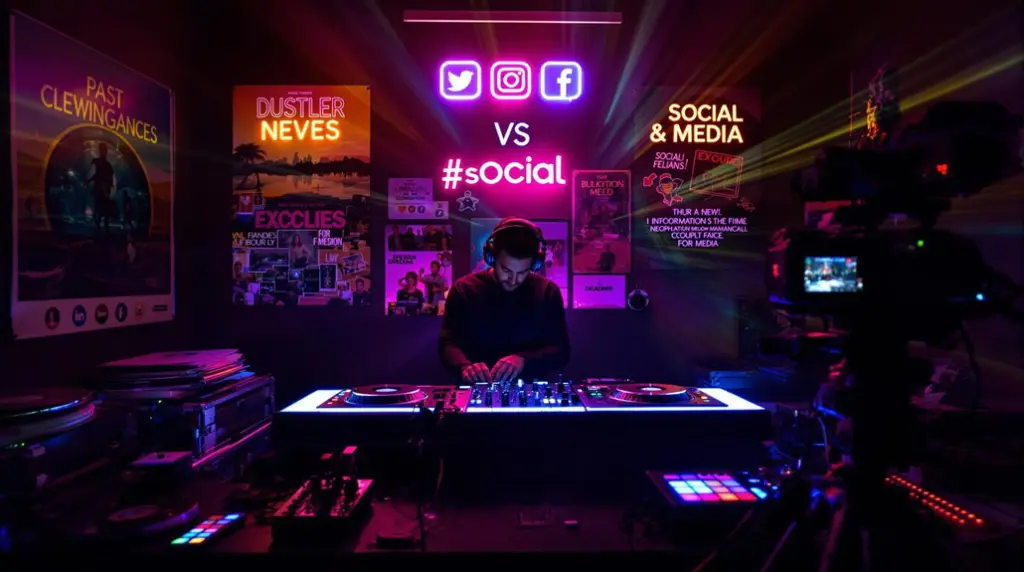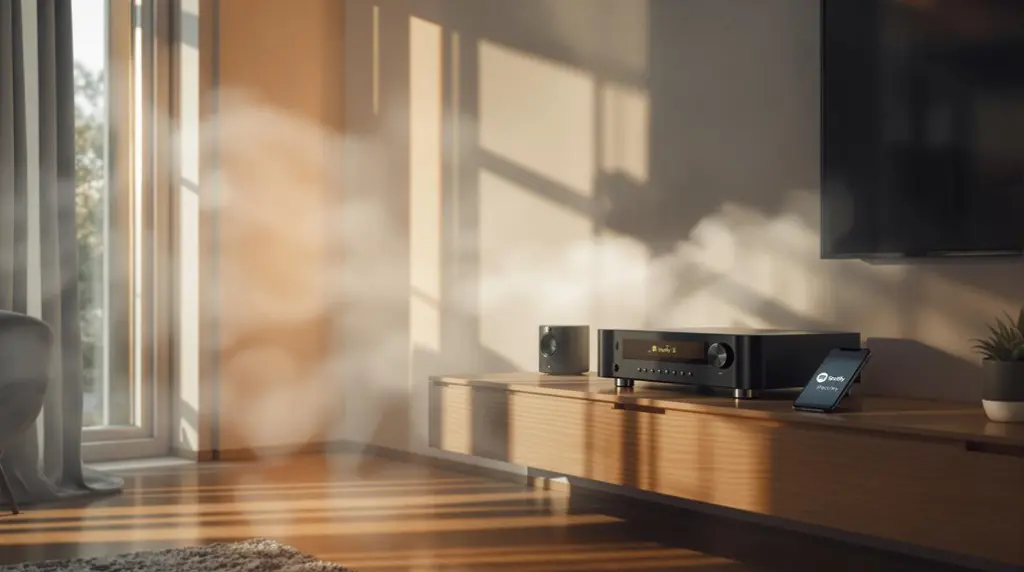When selecting the perfect venue for your DJ gigs, consider its location first. It should be near major transportation hubs with ample parking and robust security. Check the acoustics: the shape, size, and materials of the room majorly affect sound quality. Ensure the capacity aligns with your expected crowd, keeping in mind the space needed for dance floors and seating arrangements. Don’t overlook facilities—quality sound systems and soundproofing are essential. Accessibility is key; make sure there are ample entry points and it’s wheelchair friendly. Finally, dig into the venue’s reputation and negotiate costs effectively. Every detail perfects the experience for everyone involved.
Key Takeaways
- Evaluate venue acoustics for optimal sound quality, considering room size, shape, and speaker placement.
- Check venue capacity and layout to ensure it supports your event type, whether standing or seated.
- Assess venue location for accessibility, proximity to transportation, and sufficient parking for guests.
- Confirm availability of high-quality sound systems and technical support to avoid performance issues.
- Investigate venue reputation through customer feedback and past event successes to ensure reliability.
Assessing Venue Location
When selecting a DJ gig venue, it’s important to take into account its location because easy access and nearby amenities greatly enhance attendee experience. You’ll want to assess venue proximity to major transportation hubs, which is essential for guaranteeing that your guests can arrive and depart with ease. Whether they’re local or coming from out of town, easy access to buses, trains, or subways can greatly boost your event’s attendance.
Next, evaluate the parking situation. If your attendees are likely to drive, ample and convenient parking is a necessity. It’s not just about having enough spaces; you also need to make sure that the parking area is well-lit and secure.
Furthermore, check out the surroundings for potential noise restrictions. You don’t want your event cut short due to complaints from nearby residents. Understanding the local noise ordinances can help you plan your event timings better and avoid any unpleasant surprises.
Understanding Venue Acoustics
Understanding the acoustics of a venue is vital for DJs, as it directly impacts the sound quality and the overall success of your performance. Factors like room size, shape, and the materials used in construction all play pivotal roles. A well-designed space can dramatically enhance how sound waves travel and are absorbed, making your music resonate perfectly with the audience.
To achieve acoustic optimization, focus on your equipment placement. Analyzing the venue’s layout helps you decide the best spots for your speakers to maximize sound projection and minimize echoes or dead zones. Consider the height at which speakers are mounted and the direction they face. These elements are essential for ensuring every beat and note is crisply delivered to your listeners.
Checking Venue Capacity
Check the maximum number of guests that the venue can comfortably accommodate to guarantee a safe and enjoyable event. When selecting a venue for your DJ gig, it’s important to understand not just the total capacity but how different setups affect this number. Venues often have varying limits for standing versus seated events.
A dance floor, for instance, might reduce seating capacity but increase standing room, impacting how you plan your event layout. Consider the space needed for your stage setup and how it interacts with seating arrangements and the dance floor. This impacts not only comfort but also crowd flow and movement, essential for preventing bottlenecks and ensuring everyone has a good time.
Compliance with local fire codes and capacity regulations isn’t just bureaucratic red tape; it’s about keeping your event safe and legally sound. Effective venue crowd management starts with understanding these capacity restrictions. This knowledge aids in precise ticketing strategies and event planning, making sure that you never oversell the event and that every guest can enjoy the show without feeling cramped or restricted.
Always plan with these considerations in mind to guarantee a smooth, enjoyable experience for every attendee.
Evaluating Venue Facilities
As you assess potential venues for your next DJ gig, it’s essential to take into account the quality of the sound system. Make sure the space and layout align with your performance requirements and can comfortably accommodate your audience.
Don’t overlook checking for available technical support to manage any unforeseen issues during the event.
Sound System Quality
When choosing a venue for your DJ gig, it’s vital to assess the quality of the sound system, including professional-grade speakers, amplifiers, and mixers. Here’s what you need to check:
- Speaker Placement: Make sure the speakers are positioned to maximize sound coverage and minimize echoes.
- Soundproofing Solutions: Search for venues with acoustic treatments to prevent sound bleed and enhance audio clarity.
- Sound Engineer Availability: A dedicated sound engineer can adjust settings to suit your music style and crowd size.
- Monitoring Systems: Confirm the presence of systems that allow for real-time sound level adjustments.
These aspects are crucial for delivering a top-notch auditory experience that keeps the crowd engaged and energized.
Space and Layout
Evaluating the space and layout of a potential venue is essential to make sure it accommodates your DJ setup and enhances audience interaction effectively. When you’re checking out a venue, consider how your equipment will be set up. You’ll need easy access to power outlets and ample space for sound equipment. This strategic equipment placement not only guarantees a smooth performance but also maximizes crowd engagement.
Pay attention to the layout’s flexibility for staging. Does it allow visibility from all angles? This is important for engaging with your audience. Also, don’t forget to check for a backstage area. Having a designated spot for breaks and pre-show prep can make a big difference in your overall performance comfort and efficiency.
Technical Support Availability
Before booking your next DJ gig, make sure the venue offers excellent technical support and readily available on-site technicians to handle any unforeseen technical hitches. You’ll want to guarantee that technical assistance reliability and equipment availability are outstanding. Here are some essential points to ponder:
- On-Site Support: Verify if the venue provides on-site technicians to offer immediate troubleshooting support during your event.
- Equipment Check: Assess if essential DJ equipment such as mixers and microphones are readily available and in good working condition.
- Backup Resources: Confirm that there are backup resources for critical equipment to avoid any disruptions.
- Compatibility: Discuss your specific technical needs to ensure all gear is compatible and functions seamlessly during your performance.
Taking these steps will help ensure a smooth, successful gig.
Considering Venue Accessibility
As you evaluate potential DJ gig venues, it’s important to assess the accessibility of entry points. Make sure there’s ample parking and various transit options available for your guests’ convenience.
These factors not only guarantee smooth access for attendees but also ease the setup and breakdown processes for your equipment.
Entry Points Evaluation
When selecting a DJ gig venue, it’s crucial to evaluate the accessibility of entry points, making sure they cater efficiently to both the arrival and safety needs of your attendees. Here are key aspects to ponder:
- Security Checkpoints: Confirm there are adequate security measures at entrances to maintain a safe environment.
- Emergency Exits: Verify that exits are clearly marked and unobstructed to facilitate quick evacuation in case of emergencies.
- Wheelchair Accessibility: Venues must have ramps and adequate facilities to ensure inclusivity for all guests.
- Crowd Flow Assessment: Evaluate how entrances and exits can handle the influx and egress of attendees to prevent bottlenecks.
Carefully reviewing these elements will enhance the overall experience and safety at your event.
Parking and Transit Options
Evaluating the parking capacity and proximity to public transit options is crucial for ensuring your venue is accessible and convenient for all attendees. You’ll need to assess if there are enough parking spots, especially for popular events. If the on-site parking is tight, look for nearby garages or lots where you can possibly secure parking permits. Don’t overlook valet options, which can add a touch of luxury and ease for your guests.
Ensure that public transportation links are close by, and provide attendees with clear directions and transit information. You might also contemplate arranging shuttle services or partnering with rideshare companies to offer seamless transportation. This meticulous planning will greatly enhance the experience for everyone coming to your gig.
Analyzing Venue Reputation
Before you commit to a DJ gig, it’s important to thoroughly analyze the venue’s reputation by checking online reviews and ratings to make sure past customers were satisfied. Digging into the venue’s history and current standing not only guarantees you’re aligning with a reputable spot but also enhances your own brand by association.
When conducting your reputation analysis, consider the following steps:
- Review Customer Feedback: Start with platforms like Google, Yelp, and Facebook. Look for recurring themes in the reviews. Are patrons highlighting the same issues or praising similar aspects? This can give you a clear picture of what to expect.
- Assess Award Recognition: Has the venue received any notable awards? Awards can be a validation of a venue’s excellence and commitment to quality events.
- Gather Artist Testimonials: Reach out to other DJs or performers who’ve played at the venue. Their firsthand experiences can provide invaluable insights that you won’t find in public reviews.
- Check Social Media Engagement: A venue’s social media can reveal a lot about its popularity and the way it interacts with its audience. High engagement rates typically reflect a positive reputation.
This methodical approach ensures you’re making informed decisions that will benefit your DJ career in the long run.
Negotiating Venue Costs
Understanding how to effectively negotiate venue costs can greatly reduce your overall expenses and enhance your profit margins. Start by researching the average rental costs in your area to make sure you’re armed with competitive rates during budget negotiation. Knowing what others charge gives you leverage and helps you identify cost-saving opportunities.
Consider booking your gigs on off-peak days or at less busy times. Venues often offer discounts during these periods to fill their schedule, which can greatly lower your costs. Don’t shy away from asking about these options; it’s a practical approach that benefits both parties.
Moreover, explore the specifics of what’s included in the venue fee. Some venues offer value-added services like sound equipment or special lighting. These venue amenities can save you from renting separately, thereby reducing your overall expenses. Discuss whether these are part of the package and use them as bargaining chips in your negotiations.
Exploring Venue Layout
After mastering negotiations on venue costs, it’s time to focus on the venue layout to guarantee it meets your performance needs and enhances the audience’s experience. The layout of the venue is crucial for maximizing the effectiveness of your DJ gig, impacting everything from sound quality to visual engagement.
Here are essential aspects you should consider:
- Sound and Visibility: Assess how the layout will impact sound distribution across the venue. Make sure that all areas, especially the dance floor, have clear, unobstructed sound. Visibility is key for crowd interaction, so check sightlines from various points to ensure the audience can see you and your visual displays easily.
- Stage Setup: Evaluate whether the stage area is adequate for your DJ equipment and allows you enough space to perform comfortably. It’s important that you have enough room to move around and interact with your crowd.
- Lighting and Ambiance: Look for venues with versatile lighting options. Good lighting effects can transform a space and enhance the mood, complementing your music and energizing the dance floor.
- Seating and Flow: Consider the seating arrangement and overall layout for ease of movement. You want your audience to move freely, engage with the music, and have easy access to amenities without overcrowding.
Ensuring Venue Safety
Ensuring the safety of your venue is vital; you must confirm that it has effective smoke detection systems and accessible fire extinguishers. It’s essential to guarantee all safety measures are in place to protect everyone involved. Mark exits clearly and keep pathways unobstructed to facilitate a quick evacuation if necessary.
Here’s a quick checklist to help you maintain a safe environment:
| Safety Feature | Checkpoint | Importance |
|---|---|---|
| Smoke Detectors | Confirm operational and well-distributed | Critical |
| Fire Extinguishers | Accessible and sufficient for the venue size | Essential |
| Emergency Exits | Clearly marked and unobstructed | Mandatory |
| Cable Management | Secure and organized to prevent trips | Important |
Don’t forget, venue security and crowd control are paramount. Avoid overcrowding by adhering to capacity limits. It’s your responsibility to coordinate with the venue to manage entry and movement efficiently. Always be prepared to make announcements regarding emergency protocols. Proper planning and attention to these details will not only ensure compliance with safety regulations but also enhance the overall experience at your events. Stay organized, stay safe, and let the music play without a hitch!
Frequently Asked Questions
How to Approach Venues for Gigs?
To approach venues for gigs, start with thorough venue research. Contact managers with a compelling press kit, showcase your unique sound, and use smart negotiation tactics to secure the best terms for your performance.
How Do I Get Better DJ Gigs?
To get better DJ gigs, enhance your networking strategies and bolster your online presence. Reach out to industry insiders, update your social media regularly, and share your unique mixes to attract more attention.
How to Start DJING at Venues?
To start DJing at venues, focus on your equipment setup and brand promotion. Create a standout portfolio, network extensively, and use social media to showcase your unique style and technical skills.
How to Get DJ Gigs in the Uk?
To get DJ gigs in the UK, you’ll need to leverage online platforms like Mixcloud and attend networking events. Craft a compelling press kit to showcase your skills to clubs and event organizers.
Conclusion
Now that you’ve scoped out the perfect spot, remember the essentials: location, acoustics, capacity, and layout must align with your vibe.
Make sure facilities support your setup and accessibility eases attendees’ arrival. Don’t overlook the venue’s reputation and safety measures—these are vital.
Finally, get those costs nailed down. By meticulously evaluating each element, you’ll not only choose an ideal venue for your DJ gigs but also guarantee a smooth, unforgettable experience for everyone hitting the dance floor.




